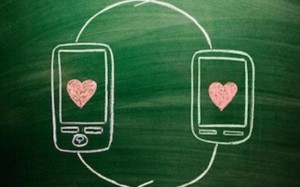?
September 26, 2016‘Always be a little kinder than necessary. It’s the only way we’re going to climb out of this hole.’
-“Peter Pan” author J.M. Barrie
Computer Mediated Loneliness & Infidelity
Maybe it was when a facebook message was inadvertently sent to me, on my birthday, on my first night, in my new location, of Port Angeles, Washington. The message spoke of donuts, a road-trip, and love. The ‘love’ part was in Italian. I don’t speak or read Italian, but love in any language is love. In Italian, it is spelled a-m-o-r-e. The intended and I do not have similar names – – our names don’t even begin with the same letter. I think there were synchronous dialogues and one too many message windows open. And. Well. Happy birthday to me.
I picked up a book about five years ago to incorporate into my COMM classes when teaching to computer mediated communication. It’s titled, Infidelity on the Internet/Virtual Relationships and Real Betrayal, by Dr. Marlen Maheu, and Rona Subotnik. Being unfaithful to a partner has typically invoked the idea of a physical action between two people not married, or committed to each other – – a broken promise of fidelity then shrouded in secrecy and deception. With the rapid and ubiquitous development of virtual communications, infidelity, according to Maheu and Subotnik, is a behavior recognized on the Internet although there is no physical contact. For me it translates to an emotional infidelity – – equally devastating. Boundaries from platonic to romantic relationships are being blurred in what is being called “turbo-charged” exchanges where “feelings of intimacy” can develop in a flash. It may be virtual but impact on real-life relationships is real and dramatic. Yep. I concur.
I could swan dive here into thoughts and expressions of heartbreak and expectations, but I won’t (too sad). Instead, how about exploring the loneliness epidemic sweeping our nation, even though we are more connected than at any other time in history? Research reveals this epidemic of loneliness is making us mentally and physically ill. The Atlantic magazine published an on-line (of course) article in May 2012, “Is Facebook Making Us Lonely?’”, by Stephen Marche. In short, yes. It is. We are living in isolation having never been more accessible. On facebook that birthday night, I had dozens of happy birthday messages from ‘friends’, yet I don’t remember feeling as lonely, or deeply hurt, as I did in that moment. Remember the final scene in the film, The Social Network, about fb founder Mark Zuckerberg? It shows Zuckerberg sitting at his computer, alone, it’s late, and he is continually refreshing the profile picture of his lost love, hoping she’ll ‘accept’ his friend request. It is haunting. And sad. And very real. A little light research reveals some 1.71 billion people on our planet are ‘active’ fb users – – active being those who have logged in within the last 30 days. For many, more likely ‘minutes.’ The basic premise of the article is that in a world of communication that is instant and absolute we suffer from unprecedented alienation. So, although consumed by socializing in virtual connection, we are becoming lonelier.
How many times have I deleted my account, only to return within the 14-day window of grace before complete disconnection? My reasons for returning are rationalized through need of academic and professional connection, yet I am concerned, and interested, in the psychological aspect of loneliness here. If loneliness indeed is a psychological state, not an external condition, then what is the connection between loneliness and our computer mediated communication? Why are Americans over the age of 45 almost three times more lonely then a decade earlier? Research has given us some perspective. Virtual communication lacks face-to-face communication and therefore is not truly considered ‘social.’ We meet fewer people, we gather less, and when we do gather, the interpersonal dynamic is “less meaningful”, and “less easy.” We have few friends, but more ‘friends.’ We’re becoming socially awkward when we meet and greet. It’s easier when we communicate via screens because feedback can be messy, and when communicating on-line, non-verbal communication is non-existent, and non-verbal communication is about 90% of the communications process.
Internet communication is having an effect on our feelings of isolation and loneliness. And our need for therapy. In the late ‘40’s, according to Marche, the US had about 2,500 clinical psychologists, and about 30,000 social workers. Today? 77,000 psychologists, and 192,000 social workers. And the psychological component affects the physical body with earlier aging, hormonal imbalances, inflammation issues, and memory loss. And then there’s depression and sleep deprivation, also increases in dementia and cognitive decline. Delete! Deactivate! But we don’t. Instead, we buy more and more gadgets so we can stay more and more ‘connected.’ We have the opportunity to connect, but with little human contact. The Internet paradox.
That night on my birthday, if I would have had those dozens and dozens of ‘friends’ hanging out with me in my hotel room eating birthday cake, and drinking champagne, that would have been a party. And a fun one. Instead, I felt the pain of Internet infidelity, profound isolation and loneliness. I also realized that I had become a partner in the virtual betrayal dance, because the one meant for the Italian love was in a physical face-to-face relationship with my love, as mine became virtual due to years of physical absence. It was a relationship, I thought, virtually exclusive, when in reality, it was exclusively virtual.
It isn’t the machine that makes us lonely. It’s how we use it. We shop online, we bank online, we take classes online, we can even attend concerts and spiritual services online, without ever being present with another sentient being. Human interactions can be messy, virtual connections are intensely mediated and created around our design of self. Sherry Turkle is a MIT professor of computer culture, who has written a number of books on Internet connection and interaction, explains it like this: “The problem with digital intimacy is that it is ultimately incomplete; the ties we form through the Internet are not, in the end, the ties that bind.” If we are “insecure in our relationships and anxious about intimacy,” Turkle adds, “we look to technology for ways to be in relationships and protect ourselves from them at the same time.”
Not to get off track here, but it’s interesting to note that personality profiles of the fb user are being studied and there appears to be a strong narcissism component. Yikes. Marche writes, “It could be argued that Facebook specifically gratifies the narcissistic individual’s need to engage in self-promoting and superficial behavior.” Definition refresher. Narcissism reveals patterns of grandiosity, craving for attention, and lack of empathy. This article was written pre-presidential candidate Trump. Anyone else make the connection?
Solitude is not loneliness. And being alone is not always lonely. But if we’re using computer mediated communication as an isolated means of staying connected, we’re stepping into a virtual world that could make us lonely, or lonelier, in our real world.
I have never connected to on-line dating sites, or found a platonic on-line relationship morphing into a romantic one. My friend, who revealed his infidelity on my birthday was once my real-life love. And when he moved to San Francisco, we moved our connection on-line. He was writing, I was teaching, on the radio and my kids were finishing up the last couple of years of high school. I re-located to Washington State arriving on my birthday, August 5th. I chose a beautiful place in this new chapter of my life, expecting my friend, my love, would soon be with me in the Pacific Northwest, a land he loves, too.
What’s that quote by William Shakespeare? ‘Expectation is the root of all heartache.’ And maybe, too, for loneliness. If we expect our virtual connections to fulfill our need for human, face-to-face interaction, and we expect those ties to bind, we will only be heartbroken to discover that they don’t. I did.
-Dayle Ohlau


